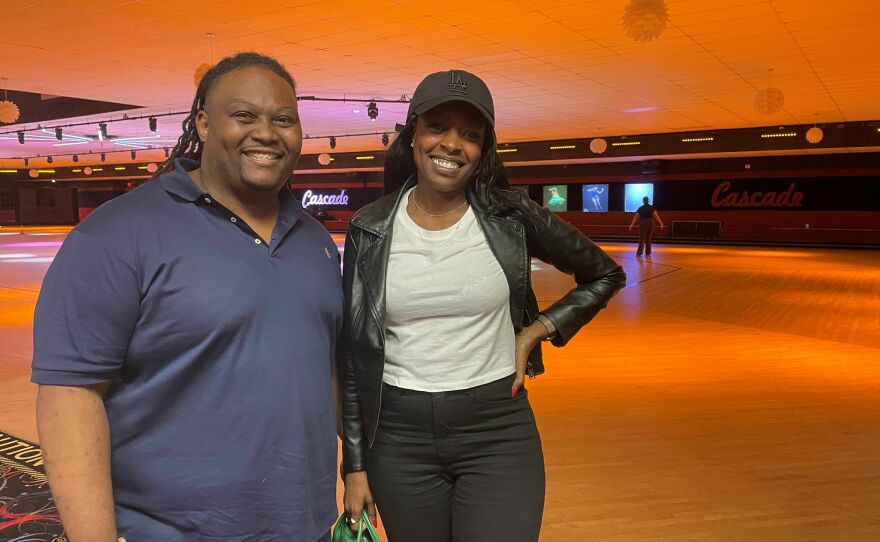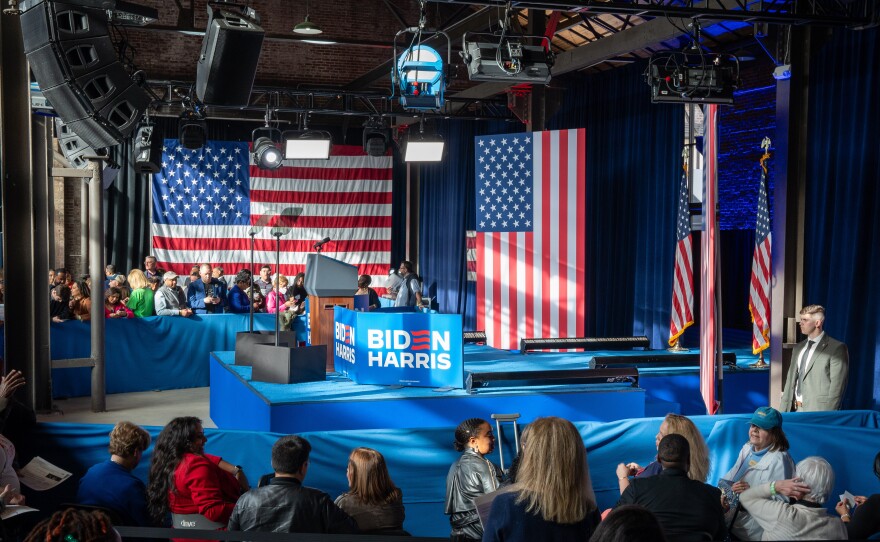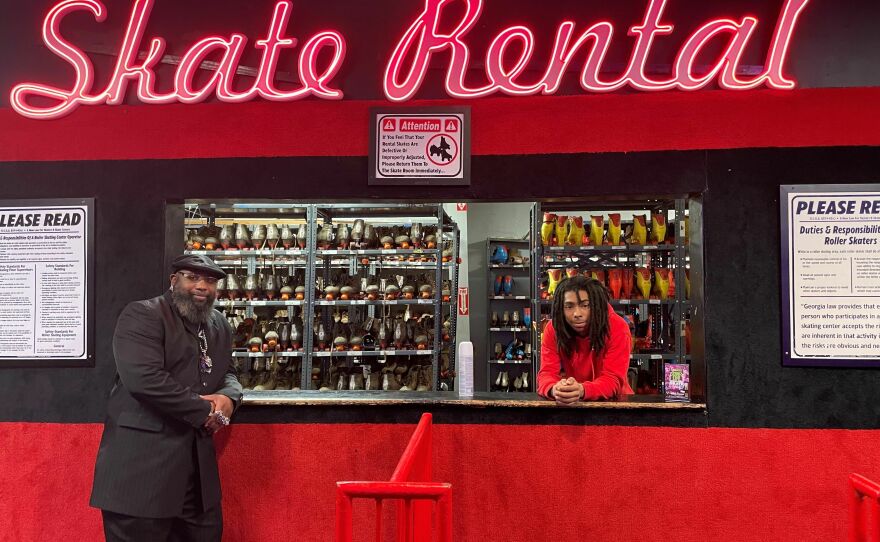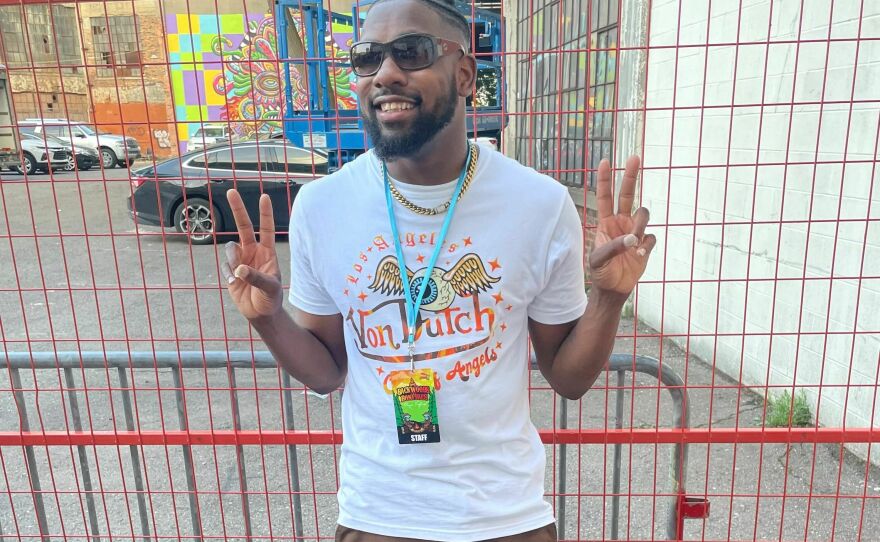ATLANTA – With its funky carpet, neon signs and moody lighting, Cascade skating rink definitely has a vibe – and it has been a cornerstone of Atlanta's Black community for decades.
Dean Anthony has been coming here since he was a kid with friends and family for roller skating, slushies and birthday parties.
"I'm not the best skater, so I have more memories falling down on the skating rink," Anthony said, laughing.
Anthony is a Democratic strategist and organizer. He says people who hang out at Cascade and places like it could shape the next election – if campaigns don't take them for granted.
Black voters played a key role in helping Joe Biden win Georgia and other battlegrounds in 2020. But as Georgia voters head to the polls on Tuesday for the state's presidential primary, organizers warn that Democrats cannot ignore the drop in Black voter turnout that happened between the last two midterms.
Along with Democratic strategists in Georgia and Michigan, Anthony helped craft a recent memo that found Black voter turnout dropped by almost a quarter between the 2018 and 2022 midterms.
"If the numbers look like they did nationally, Democrats don't win," says the memo's co-author Jack DeLapp. "We can't have a quarter of black voters in 2020 drop off in 2024."

At Cascade, Anthony says campaigns need to meet Black voters early, often and wherever they are, not just at church or a rally at a historically-Black college a few weeks before Election Day.
"I think generally there's a sense of fear that's really palatable, but also apathy to some degree," explained Nina Smith, another co-author of the report. "That's where showing up at places like this could be helpful."
All three strategists worked on Democrat Stacey Abrams' campaign for governor. Abrams campaigned at Cascade in 2022. Though she lost that election, Georgia – and Michigan – had the smallest drop off in Black voter turnout that year among six swing states with significant populations of Black voters.
Smith and Anthony say Georgia and Michigan can offer lessons for 2024. They chalk the strong voter retention, in part, to innovative campaigning and genuine outreach to overlooked communities. But while Black voter turnout improved for older Georgia voters, it fell sharply for voters under 40.
"It's not on the Black community to save America, but it is right for anyone expecting this community's vote to be intentional about caring for it," Anthony said.
Quentin Fulks, Biden's deputy campaign manager who managed Democratic Senator Raphael Warnock's successful re-election bid in 2022, was asked about efforts to turn out voters of color during a press call in January.

"Our campaign has been putting in the work to do everything we need to do to communicate with communities of color next fall to make sure they turn out," Fulks said. "Voters of color have the most at stake in this election and we need to make sure every single one of them understands the choice in front of them."
But Smith says for some voters, campaigning can feel "extractive." She thinks campaigns should offer constituent services, connecting potential voters not only with information about the candidate, but also resources in the community that can help address whatever challenges they're facing.
"Part of overcoming that is being like, how can I be a resource to you rather than me asking for you to take time away from work, take time away from your kids to come vote for me," Smith explained.
That resonates for Marcus Allen, who's unlacing his roller skates nearby.

"You have heard a lot of candidates say, 'we're going to do this, we're going to do that.' Like downtown, the streets and the potholes, they need to be fixed. Over the years, they say they're going to do it, but it never happens," Allen said.
Allen last voted in 2008 for Barack Obama.
"We need to take up minimum wage," he said. "The jobs that we have, it ain't enough to pay your bills and all of that. it's just enough to get by."
Another skater, who declined to give her name, said she was first eligible to vote in the last election, but when she showed up to her polling place, there was a problem with her registration so she couldn't cast a ballot. She felt discouraged – and she didn't feel like the election mattered much anyway. So she says she's unlikely to try again.
Hop on I-75 in Atlanta, head north, and eventually the interstate cuts through Detroit, where Branden Snyder has been hearing a similar disconnect between politics and everyday life.
Snyder directs the nonprofit Detroit Action and has been doing voter outreach for years in Detroit, a city that's key to any Democrats' winning coalition. Snyder recently moderated a roundtable for Black men hosted by a group called the League at a trendy co-working space and recording studio.
While the session was off the record, Snyder said the men had a lot on their minds.
"People want to have conversations about economic justice and abortion and criminal justice," Snyder says. "And being able to peel away the pomp and spectacle of elections and to just have conversations between neighbors and Black men was really the work that it took. If we're meeting people up front with just, 'Go vote for Biden,' then we're going to lose."
Unlike in Georgia, in Michigan, 96 percent of Black voters under 30 who voted in 2018, came back to the polls in 2022. But that year, Michigan also had a ballot referendum to protect abortion rights. And since then, many young voters have soured on Biden's stance on the war in Gaza.

Twenty-six year-old William Trice attended Snyder's listening session. Trice manages a car wash and is working on the side to grow a music career. But in the meantime, he's had to move back in with his mom as rent, gas and grocery prices went up.
"I feel like these past four years, a lot hasn't changed," Trice says. "If anything, for me, it has kind of gotten worse. Not to say that that's all Biden's fault, but I'm not sure how much of a change Biden really has made for me and my family and people like me."
Trice says he voted for Biden in 2020 and will definitely go to the polls in 2024. He's just not sure yet if it will be to vote for Biden or for Trump.
"I have a grandfather that is around the same age," Trice says. "I love my grandpa, but I couldn't imagine him having the weight of the whole country on his shoulders."
Trice says he can tell when campaign outreach isn't genuine or is trying too hard to speak to Black culture. He says he just wants candidates to take meaningful steps to address issues that matter to him.
"We've got a president that's down with us, that's cool, but I want to bring back more jobs, I want less poverty in my city, better education in Detroit Public Schools," Trice says.
Snyder says a one-size-fits-all approach to outreach can fall flat.
"So you're talking to 29 year-old black folks like you would talk to a 69 year-old black person," Snyder says. "Like, 'We need to vote because Martin Luther King marched,' that's just not resonating with a 29 year-old who's gone through two recessions, a pandemic and is social media savvy."
Snyder says to engage these voters, the message has to go beyond just who to vote for. He says organizers have to show people that democracy can work for them, too.
And, he says, campaigns have to prove they are really listening.
Snyder ended his listening session by thanking the participants for their vulnerability. Then, he raised a glass for a toast.
Copyright 2024 NPR







